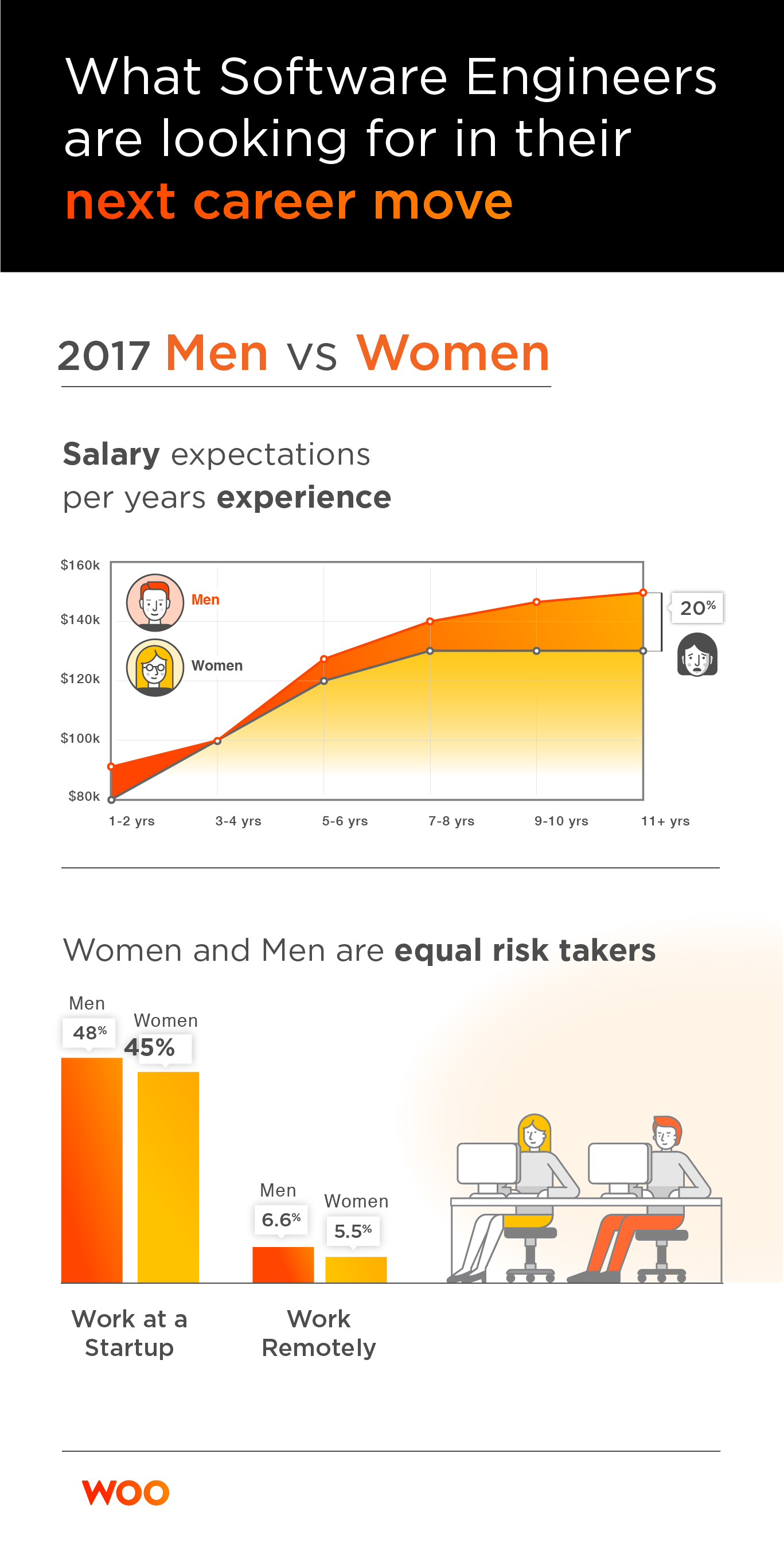As a female software engineer, you’re likely aware of the disparity between your salary and that of your male peers.
What may surprise you is that when it comes to setting expectations for your next job, you’re probably expecting less than you should.
Common sense would suggest that the women who are already working in the tech industry, gaining the same work experience and affected by the same tech advances as their male counterparts, would have the same salary and career aspirations as the men working alongside them every day.
Anonymously collected Woo data suggests this isn’t so — female software engineers tend to have lower salary expectations than male engineers with the same level of experience.
In addition, according to a recent HackerRank survey of close to 15,000 developers, over 20% of women over the age of 35 are still holding junior positions (junior developers are defined as Level 1 software engineers).
Why are female engineers setting their sights lower?
Female developers currently working in tech often describe a sense of not fully fitting in, which is one reason often given for why female students tend to reject computer science studies in the first place.
Julia Enthoven, an experienced female developer who founded her own startup, thinks that the gaps between male and female developers persist in part due to prevalent ideas of what the “typical” software engineer looks like: “I think that if CS continues to be lauded as a haven for antisocial people, the gender imbalance will persist.”
Moreover, she suggests that there continues to be a lack of knowledge regarding real-world applications of coding, “College students think coders spend their time solving theoretical problems, hacking into internet accounts, or building silly games rather than architecting situations to real-world human problems.”
These perception gaps likely translate into ongoing gaps, on the part of both male and female developers, regarding how a successful C- or VP-level software engineer is expected to look, behave, and earn.
Former coder Caroline McCarthy also described this issue, saying “There’s rampant and well-documented sexism and sexual harassment in the technology industry, particularly when it comes to the venture capital sector and male investors both directing their funds toward entrepreneurs who match their perception of what a startup founder should ‘look like.’”
So what do female software engineers expect?
According to user data collected from tech talent on Woo.io’s database, the salary expectation gap for the positions female software engineers seek increases as their level of experience grows (see infographic below). This is the case even though their level of risk-taking at work is equivalent.
Take this example as a case in point from the Quora forum: “I witnessed one interview where the woman said she wasn’t very good at JavaScript, but she answered every JavaScript question better than anyone had before. When I discussed the interview with the team, they all said ‘I think we need someone who is better at JavaScript.’

Get your Woo.io profile and discreetly receive opportunities you deserve.
Why is this trend problematic?
Technological advancement requires creative problem solvers for real-world problems.
When there is a lack of diversity in computer science professions, there is less potential to attract great minds to identify new areas requiring innovation, and then addressing them with technology.
Not to mention the fact that Fortune 500 and other successful companies with higher percentages of female leadership have been correlated with greater financial performance.
In addition, having a lower representation of female team members and leaders in the field permits damaging stereotypes about female engineers to continue, such as the views expressed in Google’s Damore memo (i.e., that women are less biologically suited to be working in tech).
The good news
Although these trends are concerning, they can still be turned around.
Female software engineers dominated the early computer science field, and continue to push it forward with new innovations.
Women currently working in the industry have already overcome hurdles and stereotypes to get to where they are today.
When armed with information about what other engineers with comparable experience are defining as career goals, as well as the going salaries for these positions, female engineers can insist on equal payment for, and recognition of, the positions they’ve earned — now and in the future.
Join Woo.io today to start start passively and anonymously seeking job opportunities matching your experience and skills.



